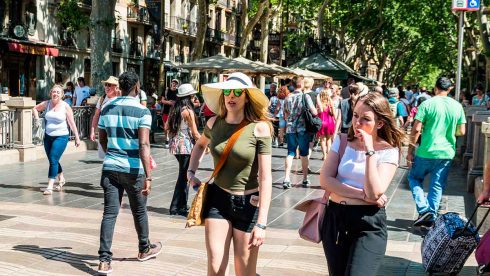ACCORDING to data released by the National Institute of Statistics (INE), 3.92% of all homes in the Malaga province are Airbnb-style tourist accommodations.
This amounts to 39,041 total homes — the highest number in Andalucia.
The INE data provides a backdrop to the Junta’s incoming tourist housing regulation, set to be approved at the Junta’s meeting on Monday, January 29.
In terms of saturation, Malaga sits behind the Canary Islands, at 4.37%; Girona, at 4.27%; and the Balearic Islands, at 4.06%.
Cadiz also recorded a high saturation, with 2.3% of all homes — amounting to a total of 14,894 — being tourist accommodations.
The Sevilla province counted 6,499 tourist homes, Granada counted 6,601, while Almeria counted 6,460.
On the lower end was Huelva, with 2,456 tourist accommodations; Cordoba, with 2,250; and Jaen, which counted just 864.

According to Tourism Minister Arturo Bernal in an interview on Canal Sur’s La Mañana de Andalucia program, the new regulation will allow municipal governments to “establish limitations regarding the maximum number of homes for tourism purposes per building or sector.”
Tourism in Andalucia has been booming.
In 2023 the community saw a record 33.9 million tourists — a nearly 10% increase from 2022.
Tourism brought in almost €25 million to the Andalucian economy in 2024, representing a quarter of all tourist income generated in Spain.
And the market for accommodations is hot.
Hotels in Andalucia registered a total of 54 million overnight stays, according to data published by the governing People’s Party.
Bernal has said that Andalucia expects to exceed 34 million tourists in 2024.
“We are talking about possibly the most powerful community from a tourism point of view,” he said on La Mañana.
But excessive tourism, while profitable, can also do damage.
Over time, tourism can alter the character of communities such that services essential to local residents lose precedence, transforming neighbourhoods into zones filled with businesses that cater only to temporary interests.
In a process that’s been dubbed “touristification,” businesses serving locals such as supermarkets, bars, and other community gathering places are replaced by those serving tourists with a higher purchasing power than the local population, leading to a general loss of habitability in over-saturated areas.
Previously, the municipal governments of Sevilla, Granada, and Cadiz requested that the Junta allow for the implementation of a tourist tax, meant to mitigate the economic impact of the intense but temporary nature of tourism on local economies.
But support for the proposed tax fell through after the arrival of PP-controlled governments towards the end of 2023 and proposals were tabled.
READ MORE


